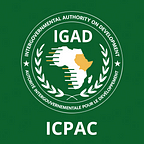A big change has taken place “back stage” in the way the IGAD Climate Prediction and Applications Centre (ICPAC) makes its seasonal forecasts since May 2019. The change improves the quality and usefulness of the forecasts and is a significant milestone for the centres’ mission to build resilience of communities in the region.
The journey stretches back over two decades to the first Greater Horn of Africa Regional Outlook Forum in 1998, when the tools available for seasonal forecasting were limited. Seasonal forecasts from computer-based models of the climate were only just beginning and the high-powered computing facilities needed were limited. Consequently, a mix of various simpler tools and “forecaster judgement” — the so-called “semi-subjective” method — became the norm across most Regional Climate Outlook Forums, including for the Greater Horn of Africa Climate Outlook forum (GHACOF).
The semi-subjective method has served the Eastern African region well for many years with advice on seasonal prospects informing preparatory action in a number of socio-economic sectors[1]. But this year, the time came for a change.
In the intervening years since 1998, the climate model-based methods for seasonal forecasting improved significantly. Through the leadership of the World Meteorological Organization (WMO), the centres making such forecasts have coordinated their efforts and made the information more readily available to Regional Climate Centres (RCCs), like ICPAC, around the globe.
Over the past two decades collaborations between ICPAC and numerous international modelling and research centres have strengthened. This has assisted information from climate models to be increasingly used in generating the region’s forecasts. Collaborations include those with the Met Office (the UK’s national meteorological service), the International Research Institute of Climate and Society (IRI), USA and with the UK Universities of Sussex, Leeds, Oxford and Reading.
So, when in 2017 WMO decided that the climate model methodology had developed sufficiently to replace the semi-subjective method, ICPAC was ready. In 2019 a Steering Group was set up to achieve this, Dr Zewdu Segele, head of ICPAC’s Climate Modelling Group said: “We had been developing facilities to make use of the climate modelling for some years and with additional support from the UK government’s WISER-W2SIP, SHEAR-ForPAc and GCRF African SWIFT projects — as well as a new high power computing cluster funded by the WISER programme — we were able to be one of the first RCCs to adopt the objective approach, based primarily on climate models, and feed the information to our member states National Meteorological and Hydrological Services (NMHSs). This is a transformational change! It replaces 20 years of the semi-subjective approach and heralds a new era in seasonal forecast services. The objective approach is based more deeply in the underlying climate science and is much better suited to development of customized services for our sectoral areas.”
Mr Maxx Dilley, director of the Climate Prediction and Adaptation Branch of WMO, said “I was pleased to observe the impressive work of ICPAC, the regional NMHSs, and international scientists collaborating in preparation and release of the seasonal outlook at GHACOF52, the first using the new recommended model-based approach. Advancement of seasonal climate services has a bright future in the region and this is setting an example for other regional seasonal forecast systems around the world”.
More information: Technical brief on adoption of objective forecast
About ICPAC
ICPAC is a specialised institution of the Intergovernmental Authority on Development (IGAD) which covers IGAD member states plus Tanzania, Rwanda and Burundi. The mission of ICPAC is to build resilience in the region through provision of quality Climate Services. ICPAC extends its services to seven main sectors including Climate Forecasting and Early Warning, Hydrology and Water Services, Agriculture and Food Security, Climate Change, Environmental Monitoring, Disaster Risk Management and Climate Information Dissemination.
Our region comprises of Djibouti, Eritrea, Ethiopia, Kenya, Somalia, South Sudan, Sudan and Uganda including Burundi, Rwanda and Tanzania.
Note to the Editors
Global climate centres under the coordination of World Meteorological Organization (WMO) will continue to provide reports on the status of global climate including El Niño updates. ICPAC will also provide regional updates on a regular basis while the National Meteorological and Hydrological Services (NMHSs) will provide detailed national and sub-national updates.
[1] Climate Forecasting and Early Warning, Hydrology and Water Services, Agriculture and Food Security, Climate Change, Environmental Monitoring, Disaster Risk Management and Climate Information Dissemination
